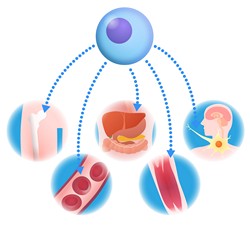Microspheres deliver DNA into cells
Recently, the introduction of four transcription factors into almost any type of mature cell has led to their reprogramming into a stem cell phenotype. This remarkable discovery, which was awarded the Nobel Prize in Medicine and Physiology in 2012, has already revolutionised biological research. These cells, known as induced pluripotent stem cells (iPS) resemble embryonic stem (ES) cells in their capacity to differentiate into any other human cell type. To date, reprogramming into iPS cells is based mainly on viral introduction of the four genes. This carries the risk of insertional mutagenesis and oncogene activation. Although non-viral methods have been used, they suffer from low efficiency and do not entirely solve the problem of foreign DNA insertion. In answer to this, the EU-funded RSM-MICROSPHERE-IPSC (Novel strategies for microsphere-mediated cellular control - a technology to generate induced pluripotent stem cells for regenerative medicine) project set out to develop a safe and efficient method for the production of pluripotent cells from human adult cells. In this context, scientists synthesised microspheres and conjugated the DNA to be delivered. The approach was successfully evaluated using a fluorescence-based in vitro model of human fibroblasts. Improving the efficiency of reprogramming above the current 1 % was among the objectives of the study. Long-term, the generation of iPS cells is expected to contribute towards improved cell therapies and replacement strategies for a wide range of human diseases. By developing patient-specific iPS cells, there is a great potential for studying human disease and personalising therapies. Importantly, the microsphere-based technology for the efficiently delivery of DNA into cells constitutes a significant advancement to existing methods and should find numerous applications in biomedicine.







